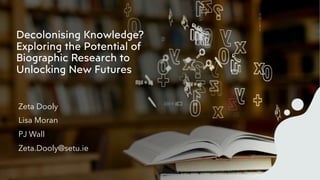ZDoolyconfAI.pdf
Presentation by SETU lecturers Zeta Dooly, Lisa Moran, PJ Wall for the Recreating the World: Critique, Control and Crisis in New Social Realities Conference 24th March 2023 Title: POTENTIAL OF BIOGRAPHIC, NARRATIVE RESEARCH TO UNDERSTANDING NEW FUTURES Zeta Dooly, South East Technological University, Ireland Lisa Moran, South East Technological University, Ireland PJ Wall, South East Technological University, Ireland Abstract The emergence of new education policies based on data, learning analytics, tertiary market demand and access is not easily understood in our communities, even though many citizen consultation processes are administered online. Much research captures tensions in global societal discourses about AI with particular reference to Ireland. Hitherto, there is scant social scientific research on societal attitudes towards AI; its value and limitations in education, citizen fears and emotions about AI technology which requires redress. Furthermore, there are even fewer studies that actively leverage knowledge from different professional groups (scientists, artists, educationalists, AI experts, sociologists, teachers) and citizens (e.g. older people, families who are members of ‘hard to reach’ groups and AI leaders) to understand individual and collective understandings of AI in education at primary, secondary, third and fourth level. This paper highlights the challenges on understanding the socio-cultural legitimacy of AI in Irish society yielding data that is highly relevant for government with regards to the structure of targeted information campaigns, communication with/to different citizen groups and usage of social media platforms and other media to enhance citizen attitudes towards AI. These challenges can be overcome using an innovative methodological approach to link the needs of communities, governments and citizens which are multi-faceted and difficult to untangle with the speed that AI technology is developing and delivering educational solutions globally and nationally. There is a lack of societal awareness and understanding in relation to the potential benefits and limitations of AI, which can lead to misperceptions, heightened sense of risk, inertia and resistance to its adoption. Governments and organizations can work together to raise awareness about AI through education and outreach initiatives aimed at different communities (e.g. older people, children) but this necessitates greater knowledge about citizen perceptions of AI, information campaigns targeted at improved accessibility, usability and societal ‘buy in’ to AI and exposure to AI technologies that combine scientific expertise with artistic expression and skills. This research promotes a collaborative approach, non-confrontational approach that invokes open dialogue, transparency, citizen participation, and the sharing of resources and knowledge through the use of biographic narrative methodology.

Recommended
Recommended
More Related Content
Similar to ZDoolyconfAI.pdf
Similar to ZDoolyconfAI.pdf (20)
Recently uploaded
Recently uploaded (20)
ZDoolyconfAI.pdf
- 1. Decolonising Knowledge? Exploring the Potential of Biographic Research to Unlocking New Futures Zeta Dooly Lisa Moran PJ Wall Zeta.Dooly@setu.ie
- 2. Overview Collaboration on AI, ethics and socio- technical futures in Higher Education (TRAIEd) Trans-disciplinarity Intricate questions about knowledge and co-creation Knowledge Legitimation Narratives of AI and Reimagined Futures
- 3. "Artificial Intelligence (AI) is no longer a staple of science fiction and is now actively influencing many aspects of our lives. From what we watch on streaming services to whom we interact on social media, and from what interest rates we are offered by credit card companies to the shortlisting for jobs, AIs impact us at many social and professional levels" (Wall, 2022, p. 1)
- 5. SFI National Challenge Fund - 'Entanglements of pedagogy' (Fawns, 2022), AI and societal impact Zeta – Digital education, KM expert, cybersecurity, SEERLab education experimentation PJ – Technology for sustainability; SFI EPE Champion, 2021 and 2022; INTEGRITY project Lisa – biographic, narrative researcher, policy analysis, Sociology of Scientific Knowledge (SSK) and Citizen Science
- 8. "Technology is advancing at a fast pace and whilst citizens are cognisant that AI holds the key for enhanced accessibility to education and transformative learning, improving the prospects for education, employment and quality of life for all citizens including frequently ‘hard to reach’ or so-called ‘vulnerable’ groups. However, it is not sufficiently transparent and accessible for citizens to understand what this means for them...."
- 9. Multi-strand approach Public (dis)-engagement from AI and knowledge democratization 'Bottom up' approach Sociology of the Everyday 'Cultural Scripts' (Enticott and Vanclay, 2013) Science versus lay knowledge Technical expertise and commercialization Walton Institute Scholarship of teaching and learning Reflexivity, subjectivity and what constitutes 'valid knowledge' - autoethnography
- 10. AI as Multidimensional Non-technical elements Discursive/narrative legitimation Reimagined meanings of knowledge
- 11. Biographic Narrative Research Intricacies of human emotion; emotional expression and/or suppression Successive states of subjectivity (Wengraf, 2001, p. 14) 'Ubiquity of storytelling' (Moran et al 2021) Entanglements in everyday life – AI in 'common worlds' Reimagining dichotomies of knowledge and ethics This Photo by Unknown author is licensed under CC BY-NC-ND.
- 12. Social construction of AI – algorithms, data and codes engender political, social and ethical dimensions (Joyce et al 2021) Usage is 'socially shaped' (Ibid) Healthcare, work, politics and policing (Sachs, 2019; Pugh, 2020) Agency versus structure-focused approaches Emotions, complexity of the everyday, politics of empowerment 'Decolonization' of AI Public scholarship
- 14. Reflections Terrains of complexity, beauty, non-linear, emotive Continually negotiated Researcher identity and self-development Multidimensionality of participants' understandings, lived realities, experiences
- 15. "Honest autoethnographic exploration generates a lot of fears and self-doubt and emotional pain...Then, the real work begins. Then there is the vulnerability of revealing yourself, not being able to take back what you've written or having any control over how readers interpret your story" (Ellis, 2004, p. 14)
- 16. Thank You! This Photo by Unknown author is licensed under CC BY.
